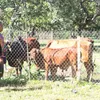Bắc Ninh urged to build closed value chain in livestock sector

BẮC NINH — The northern province of Bắc Ninh must establish a closed value chain from food processing, animal husbandry to slaughtering, processing and marketing to develop its livestock sector, said Deputy Prime Minister Trịnh Đình Dũng.
Speaking at a working session with provincial authorities to discuss its livestock sector on Thursday, Dũng hailed the province’s efforts in socio-economic development and in agriculture in particular.
He said the livestock sector’s difficulties in the past few months were partly due to oversupply and low quality products which could not enter demanding markets. In addition, livestock costs have increased, especially animal food. Food safety is still limited in processing and preserving, contributing to the recent difficulties.
“To tackle these difficulties, the sector has to reduce costs while increasing the value of livestock products. It should review planning, including the network of animal breeding processing units and slaughterhouses and link them to market demand. Spontaneous production in the livestock sector should be stopped,” he added.
The deputy PM noted that the province should enhance role of businesses and co-operatives in breeding and processing. In addition, the sector should invest in modern and focused slaughterhouses while expanding markets.
The Government will continue to complete legal frameworks to encourage investment in the livestock sector.
He also assigned the Ministry of Agriculture and Rural Development (MARD) to review planning of slaughterhouses and processing units. The ministry should work with the Ministry of Industry and Trade to better manage food safety and hygiene in breeding, processing and exports.
Statistics from the provincial People’s Committee showed that its livestock sector has developed in productivity and quality. Many new technologies have been used in production and breeding to benefit farm businesses, from small-scale breeding households to concentrated farms.
The province has about 300 breeding farms and 13 breeding firms. Breeding farms account for 39 per cent of total production value, 14 per cent more than in the 2006-10 period.
Bắc Ninh has 42 concentrated breeding farms using hi-tech in production. Six of these enterprises were granted licences for applying hi-tech from MARD, with the aim of building large-scale slaughterhouses with modern technology to meet export standards.
DABACO Việt Nam Group in the province introduced their plans to build a large-scale slaughterhouse with total investment of VNĐ700 billion (US$31.4 million). The group will invest 80 per cent of the total with the remainder coming from loans.
The plant is expected to have a capacity of 250 animals an hour or 2,000 animals a day. Its frozen meat storage system will be able to accommodate 5,000 tonnes a day.
MARD’s minister Nguyễn Xuân Cường lauded Bắc Ninh Province’s solutions in promoting livestock sector development.
Cường said the province has big potential in materials, breeding experience and markets.
He said the province should plan synchronous investment in plants, slaughterhouses and processing lines to diversify products from breeding.
It should have solutions to ensure stable material areas for large-scale slaughterhouses, he said, adding that the ministry will give support in terms of science, technology and promotion.
The Deputy PM encouraged DABACO Group to invest into slaughterhouses. He asked the group to carefully research the market to diversify their products, thus increasing competitiveness. It should also expand investment to create a closed value chain from animal breeding to slaughtering, processing and preserving. — VNS
Tags:





